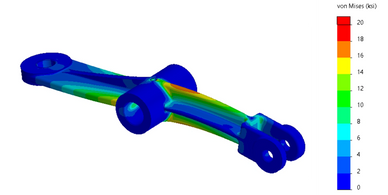Computational Fluid Dynamics
Computational Fluid Dynamics
Computational Fluid Dynamics

Paplow Consulting, LLC provides comprehensive expertise, positioning us as a key partner for pioneering solutions. Our proficiency encompasses unmanned underwater vehicles (UUVs) and systems, with a focus on simulating fluid dynamics to improve performance and efficiency. By correlating this data with power consumption and operational performance, we guide choices regarding energy sources and evaluate power generation potential. Our analytical insights facilitate the development of sustainable options for renewable energy, hybrid systems, and conventional power generation. Embracing a holistic perspective and dedication to sustainability, we assist organizations in crafting strategies that meet global challenges and embrace the principles of the circular economy. For specialized consulting in research and development and product innovation, reach out to us.
Finite Element Analysis
Computational Fluid Dynamics
Computational Fluid Dynamics

Paplow Consulting, LLC excels in utilizing Finite Element Analysis (FEA) to enhance a range of systems and structures. Our application of FEA extends to subsea handling systems, electronic enclosures for tidal turbines underwater, test rigs for certifying heavy-lift rotorcraft, and airflow rectifiers in large turbofan engines. Our FEA research has also been instrumental in selecting materials, confirming mechanical designs, and aiding in the integration of airframes. With proficiency across naval, aerospace, and energy industries, we contribute to the development of safer and more efficient systems, driving forward engineering advancements.
Fluid Mechanics & Systems
Computational Fluid Dynamics
Fluid Mechanics & Systems

Paplow Consulting leverages its fluid mechanics expertise to enhance the efficiency of pumps, valves, and pipelines, ensuring optimal fluid flow while minimizing energy use and boosting performance. We can design advanced cooling solutions for electronics, vehicular systems, and industrial processes, informed by our knowledge of the fluid mechanics and thermodynamics in heat exchange. Furthermore, we actively evaluate risks associated with fluids, such as corrosion, leakage, and hydraulic malfunctions, to avert operational interruptions and safety issues. Our proficiency fosters innovation, elevates performance, and solves intricate engineering problems in various sectors.
Benchmarking a blower design with rotating regions in flow simulation is a powerful tool for design validation and optimization. With Simulation, engineers can analyze variables like blade angle and rotational speed and gain insights into efficiency, turbulence, and heat transfer. This method identifies and resolves potential issues, reduces reliance on physical prototypes, speeds up development, and enhances design refinement.
Characterizing a pneumatic conveying system with Computational Fluid Dynamics (CFD) enhances system design and efficiency by optimizing airflow and particle movement. This leads to cost savings through reduced energy consumption and maintenance costs, while providing flexibility to test various scenarios and scale the system as needed. Our experience with engineering simulations, leveraging CFD can significantly improve your system’s performance and reliability.
Rotating regions play a pivotal role in computational fluid dynamics (CFD) analyses, especially when investigating devices such as fans, impellers, or turbines. This methodology offers a robust framework for characterizing propulsion and generation characteristics within turbines, while also facilitating the optimization of blade geometries.
The illustration on the left depicts the trajectory of a selected fluid region as it traverses the propeller and flows over the wing.
This website uses cookies.
We use cookies to analyze website traffic and optimize your website experience. By accepting our use of cookies, your data will be aggregated with all other user data.